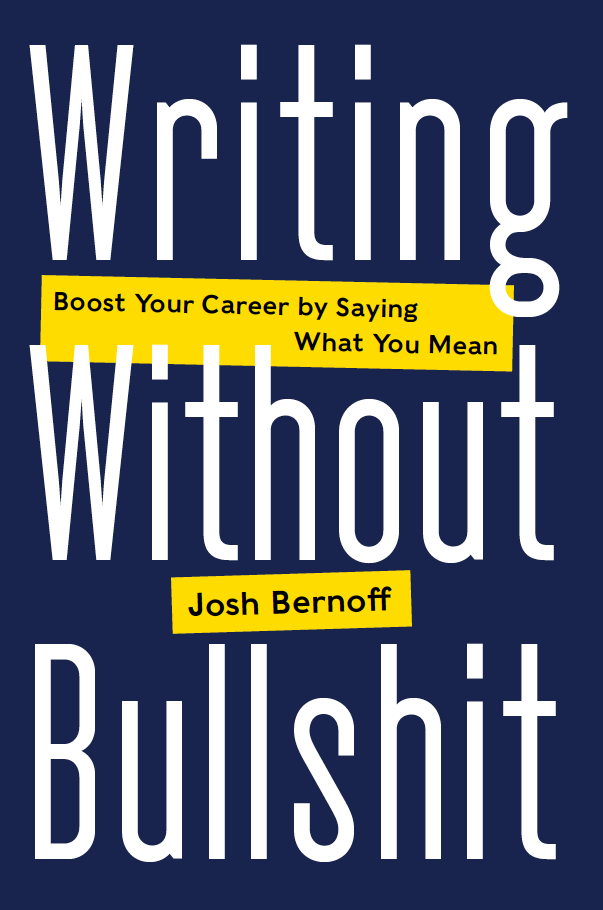Change how you write. It’s not that hard. And it’s worth it.
 The main competition for my book Writing Without Bullshit is not another book. It’s inertia. It’s easier to do nothing.
The main competition for my book Writing Without Bullshit is not another book. It’s inertia. It’s easier to do nothing.
But the changes I’ve suggested aren’t that hard to do, and they make a big difference.
The changes are simple and well-defined
Here’s what the book says you should change, in a nutshell:
- Write shorter, and front-load your writing (put the important stuff at the top)
- Avoid “toxic prose”: passive voice, weasel words, and jargon
- Use pronouns like “I” and “you”
- Make your writing easy to skim with heads, bullets, links, and graphics
- Before you write something significant, plan
- Manage reviews intelligently, rather than emotionally
- Follow some simple rules to make email, social media, marketing writing, and reports better
Each of these changes is a habit you learn quickly
It sounds intimidating to change everything. But you don’t need to do that. You can improve your writing by embracing any of these changes, one at a time.
What’s your current bugaboo? Maybe your writing is too long or poorly organized. So resolve that this week, every time you write something, you’ll go over it a second time. You’ll cut what’s not needed and organize the rest logically. That’s extra work, sure, but it’s only for one week.
At the end of the week, you’ll have developed the habit of learning to write more succinctly. Once you’ve developed that habit, you’ll look askance at every useless sentence you write. Then you’ll stop writing them altogether, and then your writing will get shorter. And you’ll actually save time, because it’s quicker to write things that are short.
The same logic applies to everything in the book. You can learn to identify and stop writing passive voice in a week. You can learn to use bullets and headings in a week. Once you do, it will be shorter and easier than what you’re doing now.
Stop dragging around poor writing habits that are not only ineffective, but also waste your time. Just pick something to change, and change it.
Each change will make a difference
Why bother making these changes? Because they matter.
The people you work with will notice. Clear writing stands out — it’s easy to spot. It makes people smile. It improves your reputation.
The habit of clear writing, once mastered, is more efficient. You’ll get more work done in less time.
Clear writing requires less rewriting. If you learn to do it better the first time, you’ll spend less time fixing it later.
Clear writing makes you a leader. If people understand what you’re saying, they’re more likely to believe what you’re saying. And it works even if you’re introverted or hate public speaking. Anyone who can write, can write better.
It’s December. It’s time to start thinking about New Year’s resolutions. Which habits will you change first in 2017?
I look forward to hearing about it.
“Clear writing requires less rewriting. If you learn to do it better the first time, you’ll spend less time fixing it later.”
That’s what I want to be able to do. I think I can write clearly, but a short email can take 30 mins to draft and re draft.